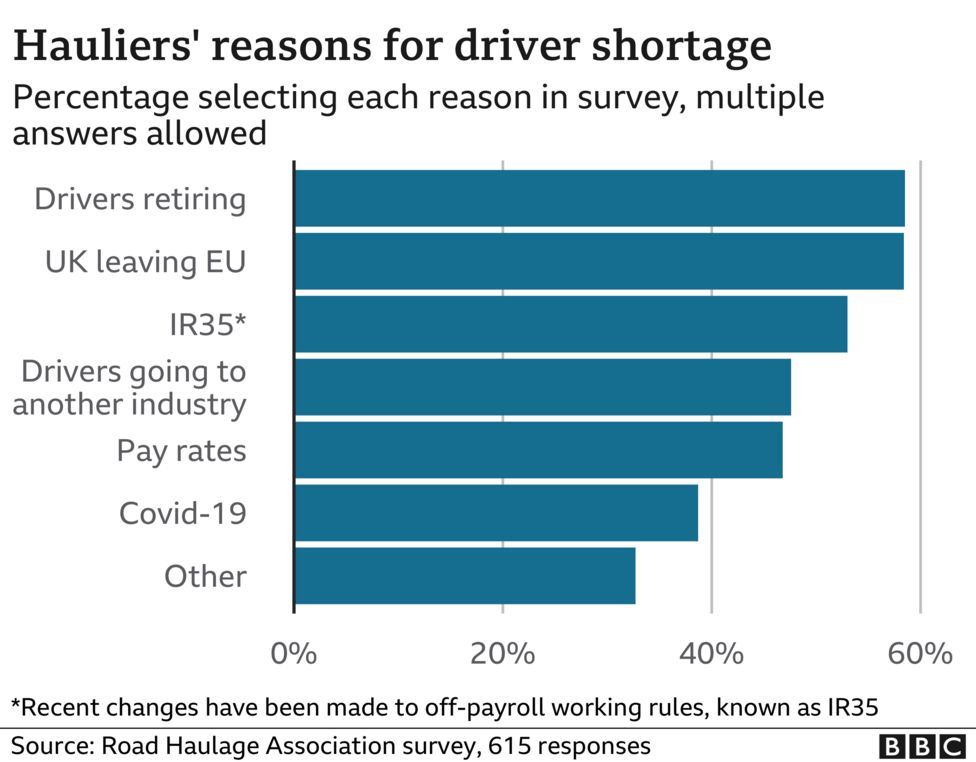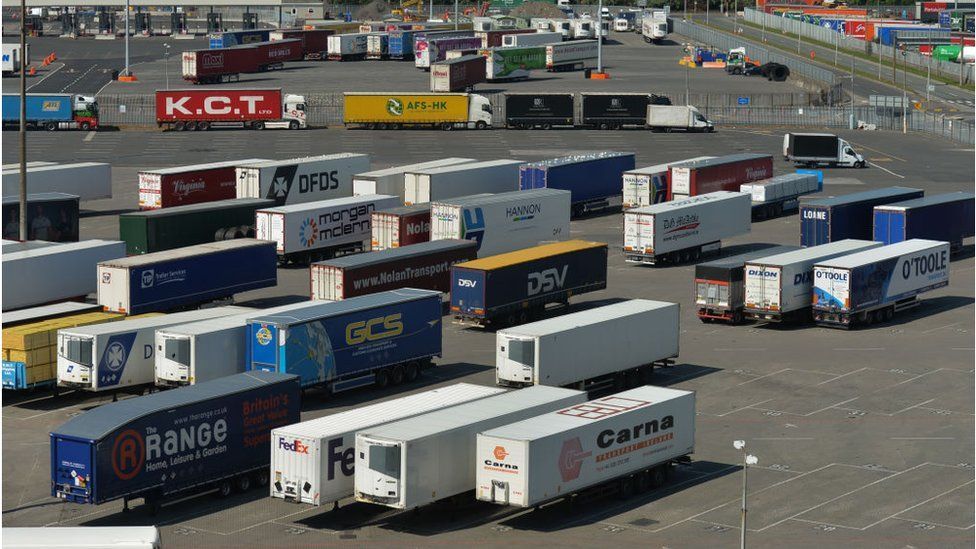
What's it like to be in the 1% of female lorry drivers?
Shanalee Johnson, who drives for one of the country's largest haulage firms, Wincanton, is part of that 1%.
The 28-year-old, who received her licence just before the pandemic hit the UK in February 2020, says her passion for driving and love of "anything that is a bit different or unorthodox" led her to seek a role in the haulage industry, after previously working night shifts in a supermarket.
"I have always been a night person," she says. "During the day there's so much more traffic, so learning at night, that was a bit easier on me personally. Even in my previous job I did nights."
As to why there are so few women driving lorries, Ms Johnson, who mostly carries out short trips around London, says the "stigma" that HGV driving is a "man's job" might be putting some people off.
"I have always loved it," she says. "I am kind of a tomboy, so for me I have got on really well with the men.
"I don't think they [the men] have ever made me feel out of place. If anything they have tried to help me.
"It's the same as driving a car isn't it? I'm actually excited to get up to go to work, to look forward to something. I see it as a career at this moment in time, it's really energising for me."
The scarcity of lorry drivers is not a new problem, but the effects of recent shortages have disrupted the supply chains of businesses and led to customers finding empty shelves in supermarkets and shops.
The coronavirus pandemic, Brexit and tax changes have all contributed to the lack of qualified drivers. Industry bodies estimate there is a shortage of about 100,000.
In a scramble to avoid stock shortages, companies such as Tesco, Aldi and John Lewis have increased driver wages and in some cases, offered lucrative joining bonuses.

It is not just women the industry is failing to recruit, but young people generally.
And, as one boss puts it, the idea that young people are not interested is a "myth", but they are put off by the costs involved in becoming a qualified driver.
Ms Johnson, who funded her own training, says that the cost of becoming a driver, which is estimated to be between £3,000 and £5,000 for training and tests, is a barrier and is "why people are put off by it".
"When you look around there's quite a lot of older people doing it," she says.
"There's nothing wrong with that - I think you can learn something from them. I think it really is to do with cost [of training]. A lot of people want to get into it."
Her employer Wincanton, which has 4,000 drivers of who just over 1% of women, has recently removed the costs of training by using the government's apprenticeship levy.

To address driver shortages, wholesale food and catering supplier JJ Foodservice is aiming to fill the gap by broadening its talent pool.
The company has launched a recruitment campaign to encourage more women to become HGV drivers.
The wholesaler said it was offering "permanent contracts with no evenings or weekends, salaries of up to £35K in London, and no gender pay gap".
The company is also using women in recruitment adverts and highlighting "support with wellbeing, which you might not associate with traditional HGV driver ads".
Wincanton's apprenticeship programme, launched eight months ago, received 1,500 applications from people under the age of 35, but many in the industry agree the sector has an unhelpful stereotype when it comes to attracting fresh talent.
Marcos Hart, Wincanton's group operations director, says the company put "greater focus" on attracting women and had used flexible working patterns to aid recruitment plans.
"It means a cultural shift, and challenging stereotypes on what kinds of people become drivers and what their backgrounds are or what they look like," he says.
He admits there still remains a need for longer-haul drivers who sleep in their cabs, but says they make up a relatively small proportion of the workforce, with most drivers back to base in a day.
Mr Hart says the current crisis is "more complex" than just a shortage of drivers, with an "exponential increase in demand" and shifts in consumer habits also contributing to the problem.
"There is a timing issue and there is a demand issue," he says. "Traditionally we would have two big peak periods in the grocery sector; Christmas and Easter. But now we are actually at a perpetual Christmas peak."
Danny Hobbs, managing director at recruitment firm StaffCo Direct, agrees that several factors have created the driver shortage, however, he believes the crisis has been "coming for the last five if not 10 years".
He says the job has not been profiled as an attractive one for young people to aspire to, and more work needs to be done to change perceptions.
"Right now, if you had a HGV licence, class one or class two, you could pick and choose what shifts, what hours, what days you work. It's literally that attractive," he says.
One potential solution to the crisis, he says, is to offer free tests for drivers wanting to upscale to HGV level or offer subsidised training courses.
Ms Johnson says if firms "give people the tools to help them", then more people will want to become lorry drivers. She adds that more companies are looking to help trainees with the costs of gaining a licence.

Industry bodies, including Logistics UK, have been lobbying the government to create temporary visas for HGV drivers from EU countries as a short-term solution while domestic drivers are recruited and trained.
The Road Haulage Association has called on ministers to put HGV drivers on the Home Office Shortage Occupation List.
However, the government has said it wants to see employers make "long term investments in the UK domestic workforce instead of relying on labour from abroad".
The Department for Transport has previously announced measures aimed at tackling the shortages, such as streamlining the process for new drivers to gain licences, increasing tests and temporarily relaxing driving hours rules.










